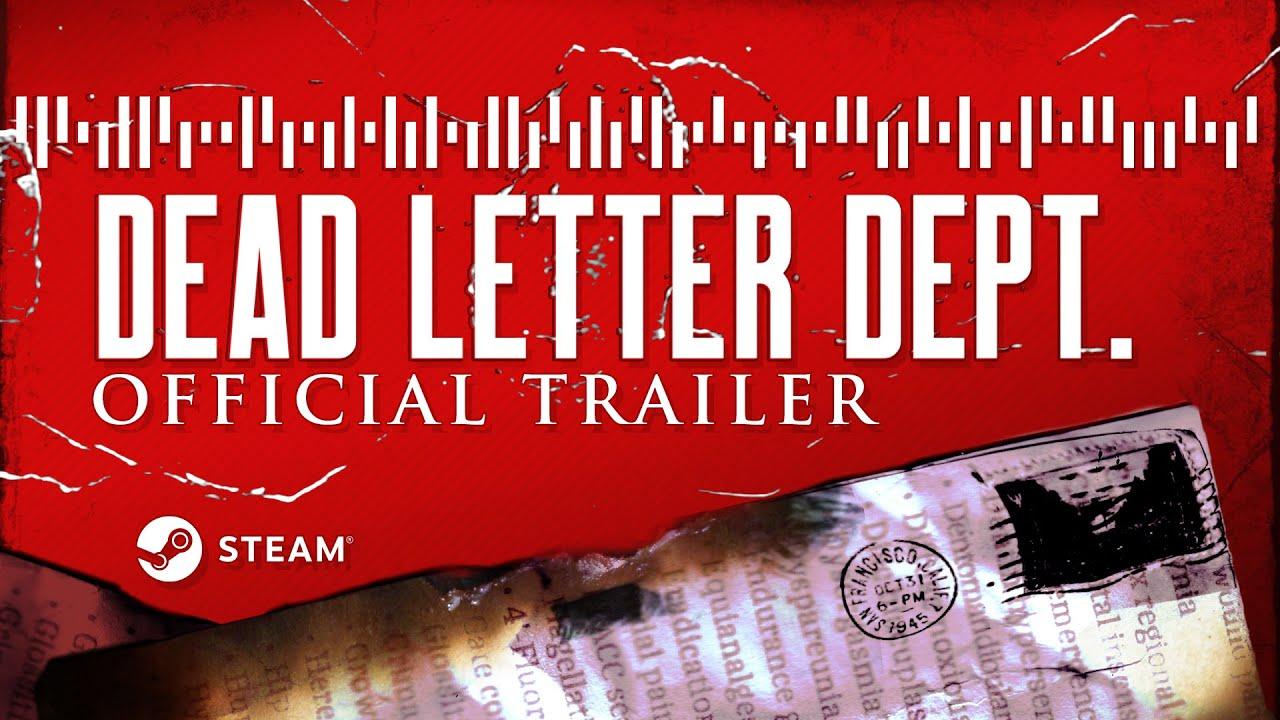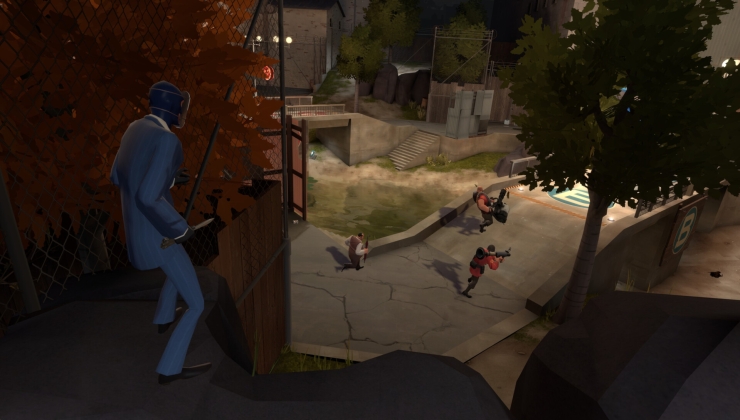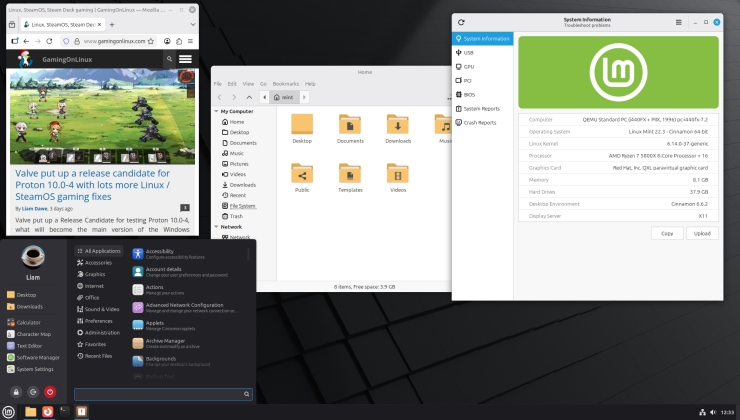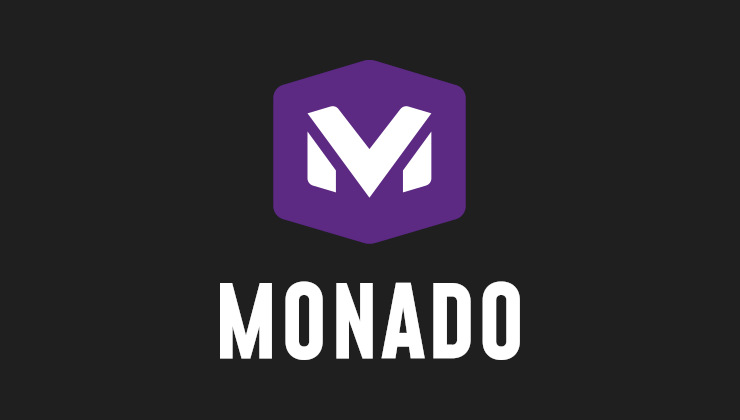Mike Monroe / Belief Engine are approaching the release of DEAD LETTER DEPT., a thoroughly creeping looking typing game and it's coming with Linux support. Disclosure: the developer emailed over a pre-release key for the game.
What is it? An unusual typing game that revolves around you taking a temp job while you get situated in a new city, being tasked with the data-entry work of typing up various words and addresses written on the mail & letters that were not able to be successfully delivered- due to bad handwriting or other reasons unknown. As the days pass on, strange stories begin to emerge from the mail you review. Sometimes it feels like they're talking directly to you.
The developer summed it up as:
- In terms of game mechanic themes, you could say DEAD LETTER DEPT. is relative to other horror games like Home Safety Hotline and The Mortuary Assistant, in which you are tasked with a job to accomplish but with rising complications as the story and tensions progress. Details lie under the surface, for those willing to look.
- Horror wise, it is a technological ghost story with the focus being on building mood, dread, atmosphere, and the fear of the unknown. There is certain programming in DEAD LETTER DEPT. that I specifically kept unpredictable for certain occasions, as I wanted the game to feel haunted even during it's own development.
- The mail in each playthrough is intelligently randomized, meaning no two playthroughs are quite the same. A typical playthrough can run around 2 hours, with multiple endings to encounter.
Check out the trailer:

Direct Link
Writing about the Linux / SteamOS support for the game in an announcement on Steam the developer said:
It's a long story really. What began as a casual investigation into making sure the game functionally runs on Steam Deck, turned into: 'Oh, the game appears to run surprisingly well on Linux???' Frankly I anticipated random filesystem explosions and graphical razorblades to have to solve for this, like with any port. But nope? It's been tested on 4 different distros (Zorin, Arch, Ubuntu, and the SteamOS of course) and appears to run pretty identical to its Windows counterpart. So I think that's cautiously optimistic enough results to try.
Frankly making a Linux version automatically solves a MASSIVE GAMEBREAKING VIDEO CODEC issue if the game would be run under Proton (on the Steam Deck), so I might as just publish a Linux version.
I realize the Linux user demand for this game isn't necessarily huge (to be fair I haven't listed it as Linux supported yet either), but I'm willing to give it a fair shot. Linux fascinates and terrifies.
Linux fascinates and terrifies.That's not an unhealthy mindset for a new user. I wish them luck.
Linux fascinates and terrifies.Me too buddy, me too. And I've been here for years now.
An unusual typing game that revolves around you taking a temp job while you get situated in a new city, being tasked with the data-entry work of typing up various words and addresses written on the mail & letters that were not able to be successfully delivered- due to bad handwriting or other reasons unknown. As the days pass on, strange stories begin to emerge from the mail you review.This reminds me of that ghastly job typing up that almost-unreadable typewriter manuscript from the '70s. Longest manuscript I've been responsible for. For all its length, it was really the content of the prose that weighed me down. I did not feel right for a week after that...
Certainly sounds like the game for me. I love me a good typing game. Typing of the Dead: Overkill was too easy, and Epistory was too long, but maybe this will be the one I remember for years to come.
Maybe nobody is learning C anymore as everybody is going straight for C++ (or Rust, or C# or or or…), but I’ve always seen C and Linux as being intertwined…
That must be it - the world moved on and I became an old man yelling at a cloud.
I’ve always seen C and Linux as being intertwinedFirst of all, I'd be very surprised if C is a popular language in game development these days, or even in the last couple of decades. And while the Linux kernel is (mostly) written in C, the language isn't tied to Linux in any meaningful way.
What I find difficult to understand: How can you learn to code software and have absolutely no contact with POSIX while doing it?C64, Armstrad, MSX, Sinclair, ... Windows, ...
Maybe nobody is learning C anymore as everybody is going straight for C++ (or Rust, or C# or or or…), but I’ve always seen C and Linux as being intertwined…Actually, developer world does turn in the Linux direction. Ever touched Docker and Kubernetes on Windows? No? Lucky you! :D
That must be it - the world moved on and I became an old man yelling at a cloud.
And our build guys are reporting an unbelievable factor (like 4 or so) in build times between Windows and Linux. :woot:
So despite being a slow moving company in a slow moving business, we will move to Linux over time.
For this alone i'll consider buying it xD
Actually, developer world does turn in the Linux direction. Ever touched Docker and Kubernetes on Windows? No? Lucky you! :Dgcc and Java are much easier to work with in Linux too and Valgrind doesn't really work on Windows(source: am a student in a class with devoted Windows users).
Basically if you want something to go fast, directly interact with the hardware do something from the past or be compatible with something weird a Posix compatible OS(and mostly Linux) is "strongly suggested" in the dev world.
Some might say, "but WSL and Cygwin exists". Cygwin installing and using is too "Linux like" scaring away the Windows users and although WSL usage is pretty acceptable the setup is a special kind of punishment and all structural changes can force you to set it up again.
Still WSL was and is a breath of fresh air for Windows users.
The primary things keeping my Windows using classmates from using Linux are descending:
- Games
- Visual studio
- Market share
- WSL
So despite being a slow moving company in a slow moving business, we will move to Linux over time.@Eike
Being slow is actually what pulls many industries to Linux in the end.
Compared to most other major industry players Linux is good with things from the past.
Game consoles are often only temporarily with their most direct predecessor after which they will start dropping this compatibility as fast as they can.
Apple has a constantly shifting set of syscalls, even changes its architecture quite often and changes its notary policies at the drop of a hat.
Microsoft is slowly abandoning its DOS roots and tries to enforce its notary policies(although they fail hard).
Linux has an active community of compatibility layer developers for all systems known to man, has no notary policies by default(although distros tend to include them) and its leaders get refreshed at the speed that they burn out(mostly common in middle sized projects, because large sized projects become one or more full time jobs and small projects don't have enough pressure).
The only real competitor in this space to Linux is bsd with higher stability, but lower compatibility. Its maintainers burn out slower than those more in the Linux/GPL space, it also has only afterthought notary policies, but its full suite of software including compatibility layers is smaller.









 How to setup OpenMW for modern Morrowind on Linux / SteamOS and Steam Deck
How to setup OpenMW for modern Morrowind on Linux / SteamOS and Steam Deck How to install Hollow Knight: Silksong mods on Linux, SteamOS and Steam Deck
How to install Hollow Knight: Silksong mods on Linux, SteamOS and Steam Deck